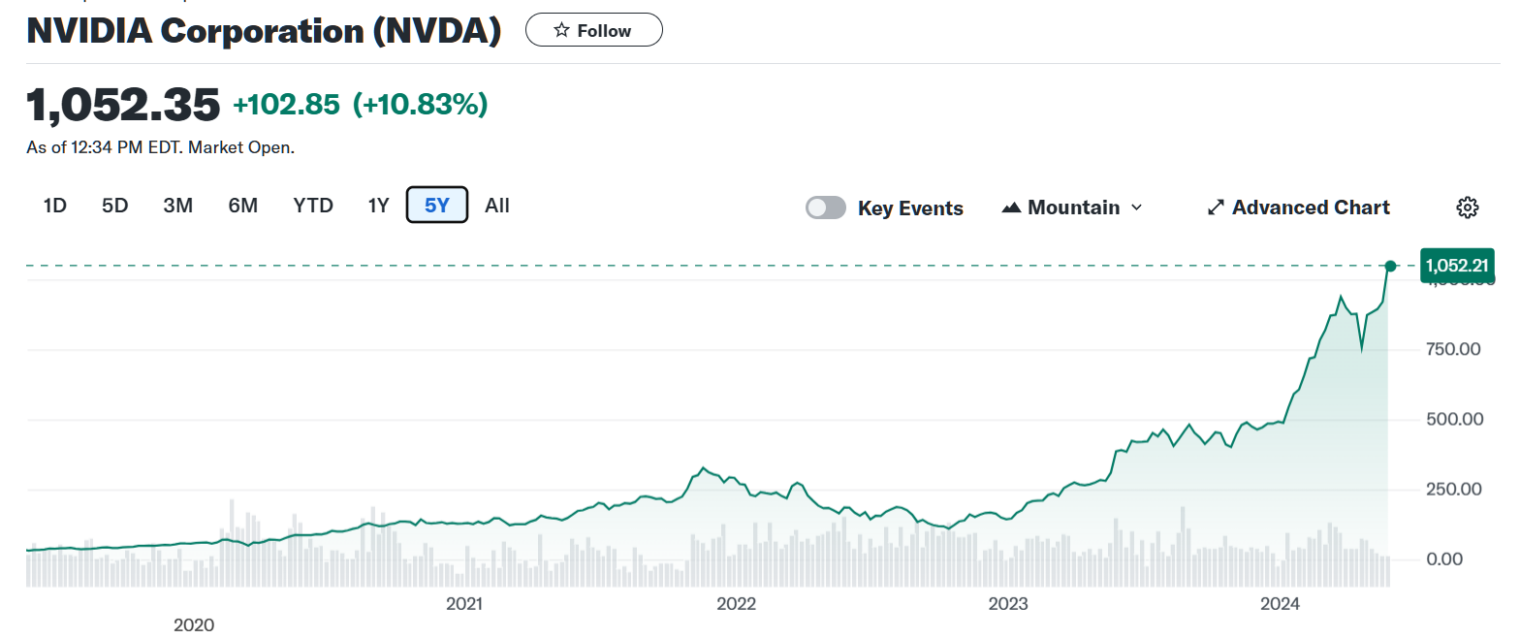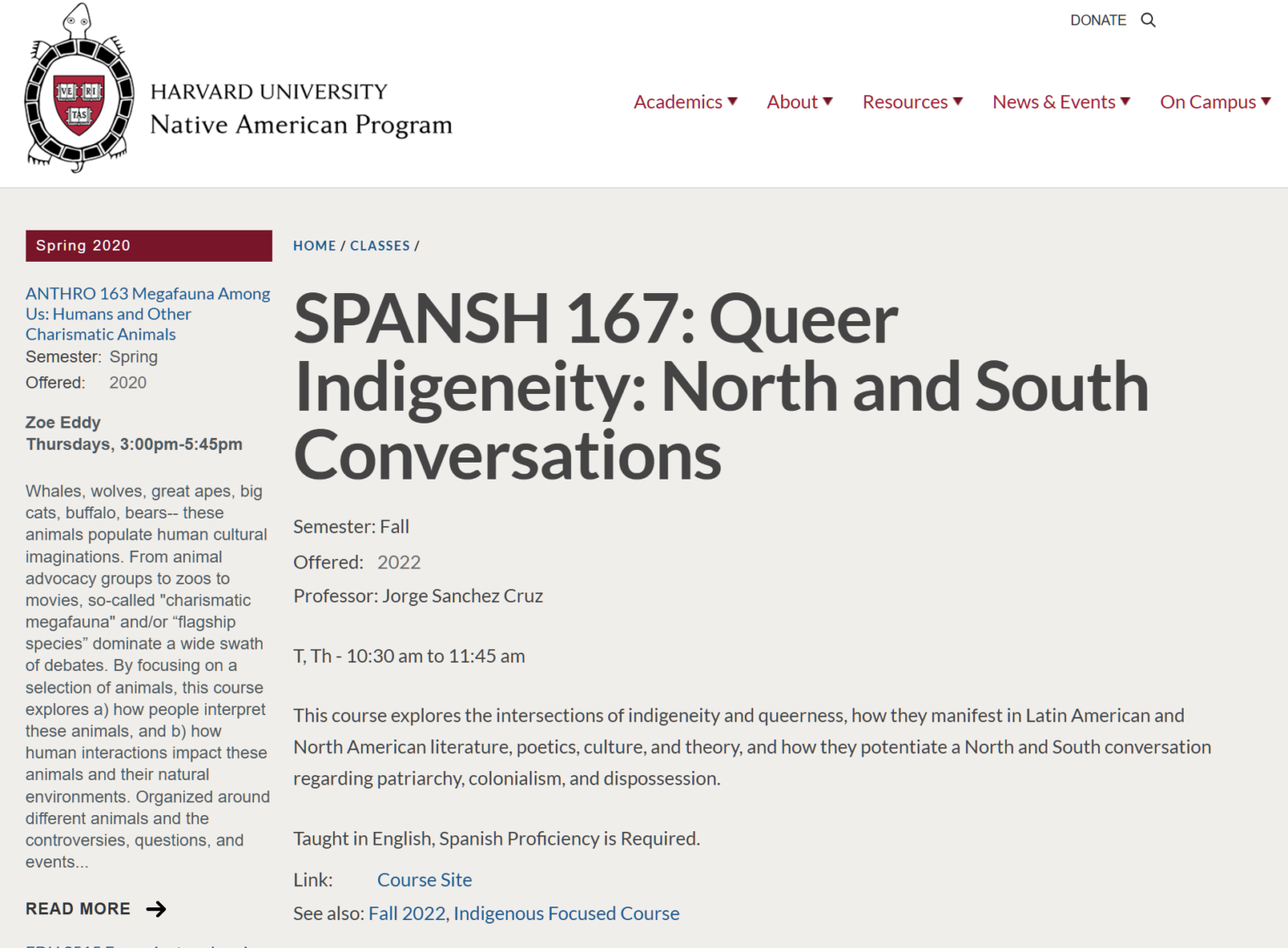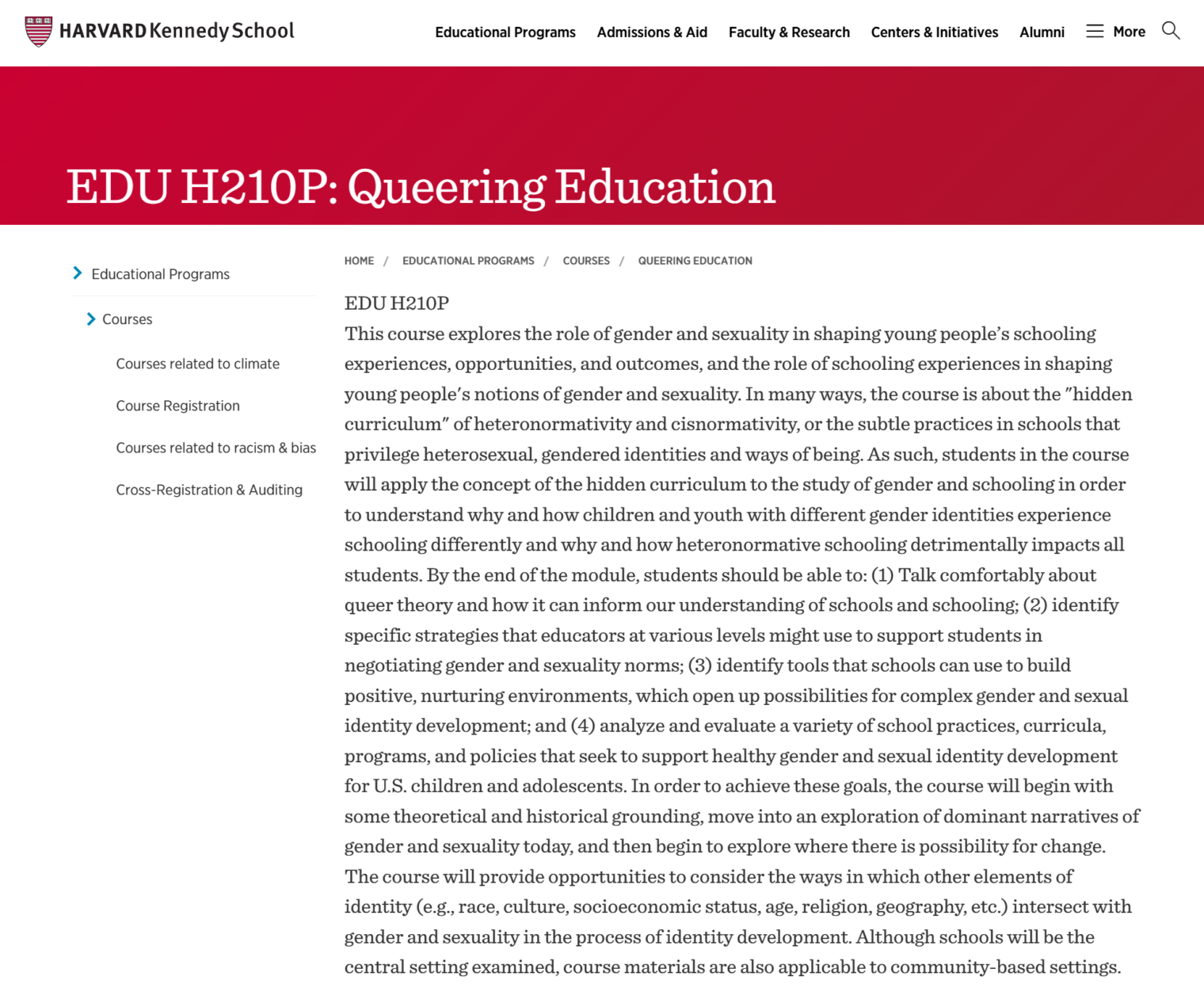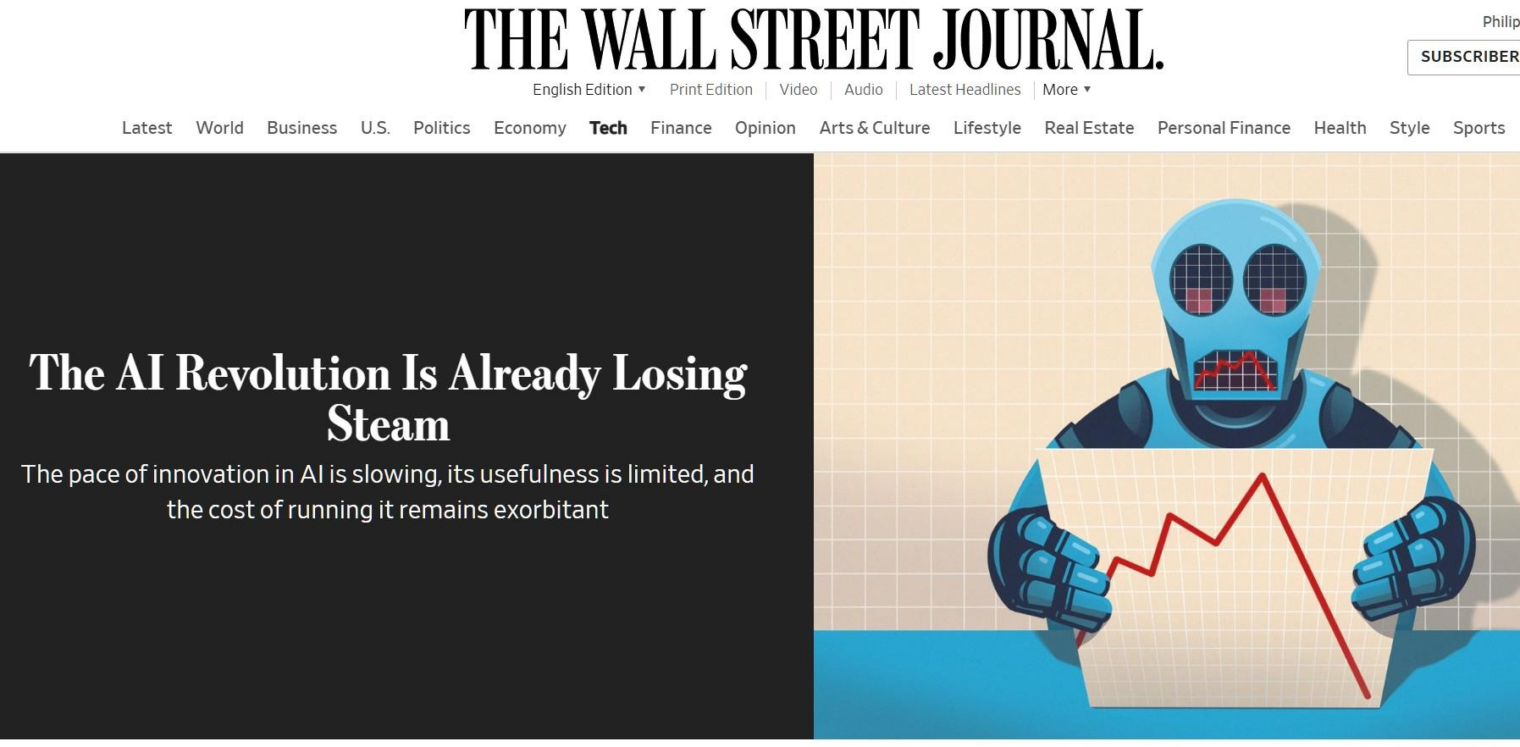A college degree is purportedly important preparation for multiple aspects of life. Universities, therefore, require students to take classes that are far beyond their major. Extracurricular activities are encouraged, such as sports, pro-Hamas demonstrations, drinking alcohol (how is that supposed to make immigrants from Gaza feel welcome?), casual sex, theater, etc. Students are forced to take about half the year off because the faculty and staff don’t want to work summers (defined as May through early September), January, or anywhere near various holidays. There is no urgency to earning a degree so why not stretch it out for four years?
What if there were urgency to getting into the workforce? Here’s the company that sold shovels to the crypto miners and now sells shovels to the AI miners (May 23):
It was a lot better to start work at NVIDA in June 2022 than in June 2024. Consider a Stanford graduate who could have finished in 2022, but instead didn’t finish until 2024. He/she/ze/they took Gender and Gender Inequality, Intersectionality: Theory, Methods & Research, and Race and Ethnicity Around the World from Professor Saperstein to round out his/her/zir/their engineering education. Was that worth the $5 million that would have been earned by starting work at NVIDIA in 2022 rather than in 2024 (two years of salary, stock options at $175 instead of at $1000, etc.)?
How about a “Bachelor’s in AI Gold Rush” degree program that would prepare students to build and use LLMs? It would be a 2-year program with no breaks so that people could graduate and start their jobs at OpenAI. There would be no requirement to take comparative victimhood classes (i.e., humanities). There would be no foundational math or science unless directly related to LLM construction (a lot of linear algebra?). There would be no pretense of preparing students for anything other than working at OpenAI or a similar enterprise.
Students will graduate at age 20. What if the AI gold rush is over when they turn 28? (Maybe not because AI turns out to be useless or even over-hyped, but only because the industry matures or the LLMs start building new LLMs all by themselves.) They can go back to college and take all of that “might be useful” foundational stuff that they missed, e.g., back to Harvard to study Queering the South:
(A friend’s daughter actually took the above class; she was most recently living in Harvard’s pro-Hamas encampment.) As a follow-on:
If the 28-year-old made so much money in the AI gold rush that he/she/ze/they wants to “give back” by becoming a school teacher, he/she/ze/they can get a Master’s in Education at Harvard and take “Queering Education”:
By the end of the module, students should be able to: (1) Talk comfortably about queer theory and how it can inform our understanding of schools and schooling; (2) identify specific strategies that educators at various levels might use to support students in negotiating gender and sexuality norms; (3) identify tools that schools can use to build positive, nurturing environments, which open up possibilities for complex gender and sexual identity development; and (4) analyze and evaluate a variety of school practices, curricula, programs, and policies that seek to support healthy gender and sexual identity development for U.S. children and adolescents.
Related:
- “Value of Nvidia jumps by as much as Britain’s most valuable company” (Telegraph via Yahoo): “The US microchip giant Nvidia has gained the entire value of Britain’s biggest listed company in a single day as the artificial intelligence (AI) boom sent shares to a fresh record high. … The one-day gain is more than the entire market value of AstraZeneca, the FTSE 100’s most valuable constituent, which is worth around £192bn. … Its market value of $2.58 trillion now puts it within touching distance of the size of the entire FTSE 100, which is around $2.77 trillion.” (at least the UK is rich in low-skill immigrants and pro-Hamas demonstrations)
- “Nvidia now worth more than all German stocks put together” (Dow Jones)






I had no idea that my undergraduate education missed so many important classes! Regardless, even at my advanced age of 54, I may still need to enroll in an AI program. After all, AI will surely eliminate my job sooner than I can re-train for a new one!
Project Manager Days Are Numbered: https://medium.com/@jjdonovan/project-manager-days-are-numbered-e2b9462bd4be
Deferred graduating in order to read the Greenspun blog, back in the day. No-one knows what the next Nvidia is now, any more than they knew what the next Cisco was. There’s a good chance CS is still the gold rush degree, but it could swing back to law or healthcare again.
NVDA is the next NVDA.
Whether video gaming, cryptocurrencies, or large language models, whenever someone invents a way to occupy humanity’s least productive minds, NVDA earns supranormal economic returns.
All has happened before. All will happen again.
Prediction: there will be a bigger gold rush in getting a bachelors degree *from* an AI, rather than getting a bachelors degree *in* AI.
Some benefits to AI replacing (or at least augmenting) teachers/profs/lecturers:
– speaking in perfectly clear English
– optimized for results, trained via real-time feedback from global user base
– available 24/7 to answer questions, help with assignments
– tests graded objectively, consistently, near instantaneously
– personalized teaching speed and content
– produce yearly revised textbooks (PDFs?) for free
– cheap (even cheaper than grad students!)
For the vast majority of people, everything after the 2nd year of High-School in the US is an economic waste. Even for doctors, engineers, and lawyers a heck of a lot of the education requirement is to create barriers to entry.
And just to be clear, I am not an elitist looking down on people. I am a person who barely managed to graduate high-school and went straight to work at age 18.
By the time my peers entered the workforce, I had 4-years of work experience and no debt.
Most people with an undergraduate degree in whatever from whatever school will simply not catch up to the person who started working 4 or 6 years earlier even if all that person brings to the table is the ability to show up on time. If you can show up every day, in less than four years you’ll be the manager of a McDonald’s and likely making more than a CS undergraduate.
Daniel: I think you’re right if the measure is productivity. Actually working is way more instructive than sitting in a classroom. But for someone whose goal is a desk job where no more than 1-2 hours/day of work are required, the university degree is useful. College is important for people whose life goal is to be unproductive and yet paid $150,000/year. Yes this is less money than a supermarket manager, but not less money than one would make working 1-2 hours/day in a supermarket.
Outstanding! The muddle created in the minds of students taking these nonsense DEI classes is a detriment to their ability to gain productive employment and, more importantly, to live a fulfilled life. Parents should do everything possible to send their children to universities that have not embraced DEI-based education and rather focus on classical liberal arts and useful classes to living in a world that needs level heads and people who appreciate traditional values that have been proven over the centuries to advance human civilization and provide joy and satisfaction that one has done a job well and contributed to strengthening the fabric of society, e.g., marriage, children, community, …